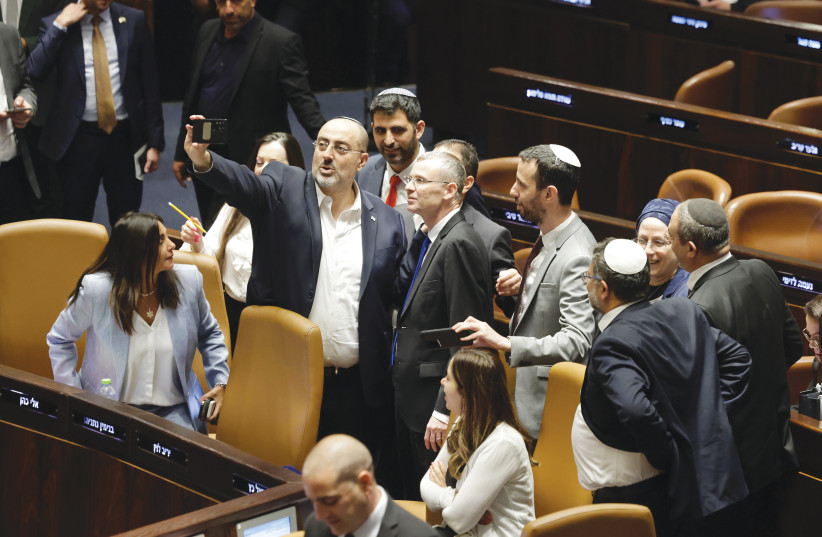Israel vs Judaism: Can these two identities coexist? – opinion
With great pain, I am forced to admit that Israel finds itself in a time of deep crisis, among the deepest we have faced in the 75 years of our state’s modern existence.
This is by no means just a political crisis. It is in every way a social, legal, economic, and security crisis. Yet I believe the most painful aspect of these developments is that more than ever before, our nation openly seems to declare that we have been split between two critical aspects of our identity – our Judaism and our “Israelism.”
Whereas the “Israelism” tribe sees the ideals of modern Zionism and the strength of liberal values as paramount to our identity, the Judaism tribe places tradition, attachment to the land, and other ancient values at the forefront.
While these ideals need not, and must not, contradict each other – and indeed there are representatives of both perspectives within all elements of the greater Israeli society – the current crisis has put them at odds to the point of outright social conflict.
The pain of those who might favor the “Israelism” camp – represented by people from all across Israeli society – firmly believe that not only are their interests being ignored by the other side, but that the divide is so deep that they are being laughed at, as was reflected when upon passage of the bill surrounding the reasonableness clause, the legislators posed for a “victory selfie.”
 COALITION MEMBERS take a selfie after the Law to Cancel the Reasonableness Standard passed on Monday in the Knesset. (credit: MARC ISRAEL SELLEM/THE JERUSALEM POST)
COALITION MEMBERS take a selfie after the Law to Cancel the Reasonableness Standard passed on Monday in the Knesset. (credit: MARC ISRAEL SELLEM/THE JERUSALEM POST)The price of this process is undeniably terrible – from both the social and Jewish perspectives, with some Jewish restaurateurs even choosing to open for business on Tisha Be’av. I tremble to think about what Yom Kippur might look like amid these tensions. We are witness to a phenomenon where hateful sentiments are being thrust to the very forefront of the public consciousness.
Tensions within Israel are mostly misconceptions made worse by judicial reform
But I know from the depth of my heart and decades of experience at Tzohar, working closely with Israeli Jews from all backgrounds, that the current tensions are not – God forbid – about hatred of the other. Rather, they are largely the result of a series of misconceptions and failure to appreciate the other’s position, made all the worse within the context of this judicial reform crisis.
Yet despite what seems often portrayed as all darkness and pessimism, I also know that there is a great deal of light and hope.
For the first time in years, we are witness to a situation where millions of Israelis – wherever they might lie on the political spectrum – are investing themselves in the question of the character and future of our nation to the extent that they are actively protesting, and coming out for demonstrations.
While they certainly might not see eye-to-eye on many key issues, both groups are firmly grasping the flag of Israel, both love their country – and I truly believe that both live with the desire to speak to one another.
Most people want to find a way to co-exist.
The essence of our identity and the reason that I am hopeful is that we live based upon a covenant in which we determine our destiny rather than our fate being predetermined for us. This idea, advanced by Rabbi Joseph Dov Soloveitchik, is more important today than ever.
For many decades, perhaps for most of our people’s history, we lived with the belief that our fate was determined by our enemies. We were always threatened by outside forces and that was a central aspect of our national unity. In today’s world, that is no longer the defining aspect of our identity. We are a people with a strength that promises protection against the threat of destruction from foreign forces.
Yet the real threat now is the one that we have created from within. The challenge, therefore, becomes how we find the way that will ensure that we can live together.
In conclusion, I feel it important to stress that as a rabbi, my place is certainly not to impose a legislative solution, nor weigh in on the merits of any specific approach to judicial reform.
But my role must be to feel the pain of my fellow Jews and with God’s blessing, to work to the best of my abilities to feel the pain of others and be inspired to create a better future for ourselves and our children.
As someone who has spent the majority of my life working to bridge the gaps between these worlds of Jewish and Israeli identities, and been blessed to be involved with Tzohar – an organization determined to achieve just that by bringing together Jews of diverse backgrounds through a shared love for tradition and identity – I know those areas of common purpose do exist.
Today more than ever, it is our responsibility as a Jewish society to work towards them and to embrace them. We must restore a reality where every citizen and defender of this country can be equally proud of his or her Jewishness and Israeliness.
Ignoring the depth of the divide would be irresponsible, yet I know that achieving that vision is possible. We can, and must, live with the hope and the confidence that whatever divisions which exist within our society today, will be overcome and we will once again be one people with one heart.
The writer is the founder and chair of the Tzohar Rabbinical Organization in Israel.





Comments are closed.